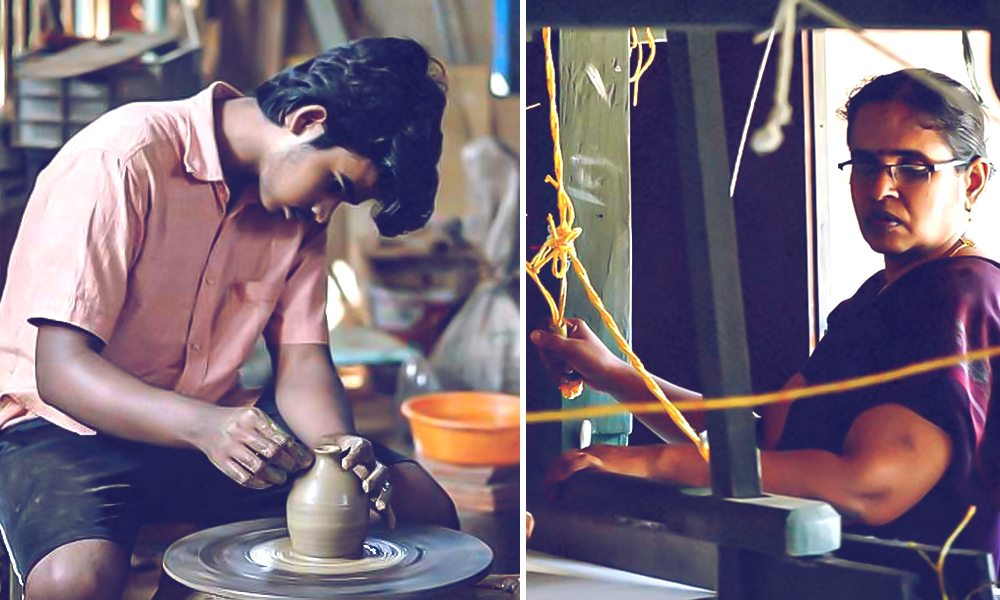
Image Credits: Instagram/Farmershare
This Kerala Farm Teaches Children To Grow Food, Weave Clothes, Live Self-Sufficiently
Writer: Palak Agrawal
Palak a journalism graduate believes in simplifying the complicated and writing about the extraordinary lives of ordinary people. She calls herself a " hodophile" or in layman words- a person who loves to travel.
Kerala, 22 March 2021 8:16 AM GMT
Editor : Prateek Gautam |
A free soul who believes that journalism, apart from politics, should stand for social cause and the environment.
Creatives : Rajath
A free spirit who find meaning in life with the virtue of creativity and doing job par its excellence, animal lover and traveller by heart.
Ambrose Kooliyath's 10-acre farm in Kerala's Palakkad district is popular with the community for thriving on the idea of self-reliance where individuals including children learn skills like farming, weaving, pottery and construction-related techniques.
On the outskirts of Shornur town in Kerala's Palakkad district is Ambrose Kooliyath's farm. The 10-acre agricultural land is popular with the community for thriving on the idea of self-reliance where individuals including children learn skills like farming, weaving, pottery and construction-related techniques.
Ambrose, a school dropout and a mason by profession, started working when he was barely 15. He spent a significant portion of his life as part of labour unions, ran a restaurant in Kochi for a brief period, and has a 30-year-experience in farming to his credit. All these years of juggling work taught him the importance of building things with his hands and he desires to let people experience similar joy.
Therefore, Ambrose leased the land from a close friend for a period of twenty years. And over the past three years, he has been working to change the idea of education and employment with his unconventional institution, the Farmer's Share, according to EdexLive.
"The essence of it all is the Gandhian concept of self-sufficiency and self-reliance. His idea of a just society is one where the basic needs of a person — food, clothing and shelter, are met with products sourced from within one's locality, and not imported from outside. The farm is an attempt at that," Ambrose told The Better India.
"There was a time when families survived on the produce from their compound and made houses using locally available material. Now, for every morsel of food, every household item or piece of clothing, we're dependent completely on the market and international brands. Kerala currently imports more than 80 per cent of the rice it needs from other states," he explained.
Ambrose is of the opinion that teaching people to use their minds to build things with their hands helps in empowering them and in the long term helps in making the community self-sufficent and resilient to adversities.
He asks that although Kerala boasts of a 100 per cent literacy rate, how many would be skilled in growing their own food or building a house for themselves? He pointed out that there was no school or education system that was teaching crucial life skills to children.
"Even a small knife that we use is made by a big company. People who specialise in such trades and crafts at the local level are left orphaned. Those who have been doing such work for centuries are not respected and their work is no longer valued. And most people have stopped doing the work altogether because they are worried about how they will survive. The only thing that has any value is money. Gandhi himself said that technology and development can help the masses only if it supports the community, without that, who is it for?"
A father of two, Ambrose has homeschooled his children. Amal and Akhil along with a few teenagers have been staying on the farm to learn and help. He shared that it was a conscious decision to move his kids away from a system that instructed them to chase a certain 'respectable set of professions' and to consider others below their dignity. From agriculture, pottery to weaving clothes; one learns how to provide for their own selves.
"Here, the aim is to teach them how to live, it's not with the sole purpose of learning how to make money. When you do this, children only search for jobs that will keep them safe and they never go after what they truly want to do. When you look at it like that, you need a certificate and it can make or break you. It determines your worth and what salary you get. Children cannot learn in this fear," he said. I'm not saying everyone should grow their own rice and weave their own clothes. But we should try and see why a farmer doesn't want his son to follow in his steps. Because he is not given a fair price for his produce, neither is he allowed to set one. In our farm, we sell our own produce, and associate with neighbourhood farmers and help them sell their products at a fair price," he said.
Also Read: This 25-Yr-Old Techie's Initiative Is All About Staying Fit And Clearing Trash
 All section
All section














